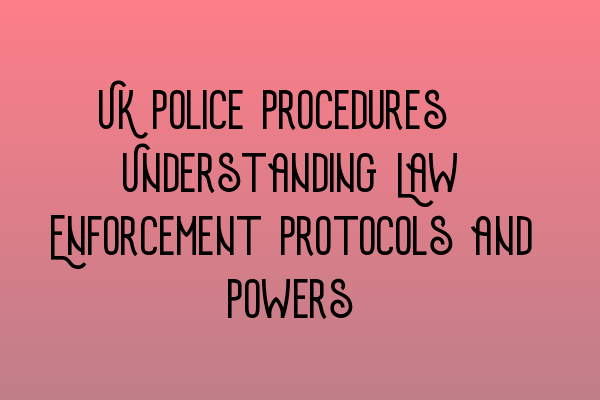UK Police Procedures: Understanding Law Enforcement Protocols and Powers
Law enforcement plays a vital role in maintaining order and ensuring the safety of the community. Understanding the procedures and powers of the UK police is essential for both legal professionals and members of the public. In this article, we will explore the key aspects of UK police procedures and shed light on the law enforcement protocols and powers that govern their actions.
Police Powers
The police in the UK have specific powers granted to them by law. These powers enable them to effectively carry out their duties and responsibilities. Some of the key powers include:
- Arrest: The police have the authority to arrest individuals suspected of committing a crime. Click here to read more about business regulations in the UK.
- Search and Seizure: The police can conduct searches and seize evidence if they have reasonable grounds to believe that it is necessary for the investigation of an offense.
- Stop and Search: Under certain circumstances, the police may stop and search individuals if they have reasonable suspicion that they are in possession of prohibited items or are involved in criminal activity.
Investigation Procedures
When a crime is reported, the police initiate an investigation to gather evidence and identify the perpetrator. The investigation process varies depending on the nature of the crime, but it typically involves the following steps:
- Initial Response: The police respond to the crime scene and ensure the safety of the individuals involved.
- Evidence Collection: The police collect physical evidence, interview witnesses, and gather any available CCTV footage or other forms of digital evidence. Learn more about evidence collection here.
- Suspect Identification: If a suspect is identified, the police may use identity parades or other identification procedures to confirm their involvement in the crime.
- Arrest and Questioning: If the police have sufficient evidence, they may arrest the suspect and proceed with questioning. It is important for individuals to understand their rights when being questioned by the police.
- Charging Decision: After the investigation, the police will determine whether there is enough evidence to charge the suspect with a crime.
Legal Safeguards
While the police have extensive powers, there are legal safeguards in place to protect the rights of individuals. These safeguards include:
- Right to Legal Representation: Individuals have the right to legal representation during police interviews and court proceedings.
- Right to Silence: Individuals have the right to remain silent during police questioning, and this right cannot be used against them in court.
- Detention Limits: The police can only detain individuals for a certain period of time without charge. Learn more about the SQE exam and exam preparation here.
Conclusion
Understanding UK police procedures, protocols, and powers is crucial for everyone involved in the legal system. Whether you are a legal professional or a member of the public, having knowledge of these aspects can help protect your rights and ensure fair treatment. If you require legal advice or guidance on police procedures, it is recommended to consult with a qualified solicitor. To learn more about forming an LLC in the UK, check out this step-by-step guide.
